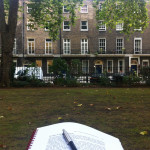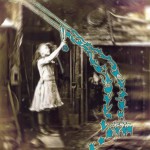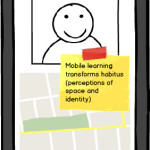I was just looking through my old folders on the request of a friend who was thinking about applying to doctoral school. He wanted some examples of doctoral research proposals and I dug mine up from Columbia, Cambridge, NYU, Institute of Education and University of Edinburgh. All in all, I had written like three distinct research proposals tailored to the focus of each of these universities. For the American universities, there was a much stronger focus in the proposal on the technology itself (which I considered a weakness of these programs). For Edinburgh, a much stronger focus on the communities of mobile learning, the hybrid practices, and people. For the Institute of Education and Cambridge, there was a stronger focus on the ICT4D elements of the equation, much more directed towards solving a real-world problem. So three, more or less, distinct research proposals.
Judging by the timestamps, I noticed that I had started writing these in the summer of 2010. I submitted my applications in the fall of 2010, was accepted to all of them, made my decision by the early spring of 2011, deferred one year and started my PhD in the fall of 2012. Here I am in the middle of my second year in 2014 and the changes in these research proposals and my current thesis are stark. So I thought it might be worthwhile to briefly outline the differences and perhaps offer some reflection on my process or anyone worried that their submitted research proposal locks them in to one train of thought for the rest of their life.
First, the proposals. I bring you the IoE version of this proposal in 2010 and now (as of my upgrading last month).
The 2010 version follows the University of London proposal guidelines to the letter. The 2014 version is more or less where my thesis stands to date. And these aren’t cosmetic changes; the 2014 version is much closer to what I submitted to Edinburgh back in 2010. It has a much stronger focus on multimodality, space/place, hybrid practices of mobile learning than the original IoE version did (being much more focused on ICT4D).
The content changed
My original focus (2010):
It is the intended goal of this research to explore the requirements for potential expert-level mobile applications for the non-sciences, specifically Literature, Cultural Studies and History. The target audience for these expert level applications will be university students at higher education institutions in nations classified as developing by the World Bank. Specific subjects generally considered humanities-based are targeted not due to any inadequacies on the marriage of mobile learning and science; rather, these subjects are chosen primarily due to the absence of expert-level mobile learning frameworks and applications for university level education in both developed and developing nations. In short, very little research has been conducted to determine whether mobile learning in the humanities is a suitable vehicle for higher education in developing nations; a framework will be applied to assess whether this is indeed possible, whether mobile learning in these disciplines can support reflective, multimodal, and collaborative knowledge construction, creating work that can be disseminated and appropriated by the larger academic community. This research will explore whether these core characteristics and requirements can be adequately expressed for the purposes of higher education with mobile learning.
Some flighty prose in there (which is natural enough when one is just starting out) and a much more ambiguous idea than what I have now (2014):
This research project explores mobile technology use by graduate students in the humanities in two of the universities of South Korea. For the purposes of this research, the humanities will be limited to the disciplines of language, literature, history, cultural heritage, archaeology, and an interdisciplinary offering that encapsulates several of these, Korean Studies. These disciplines are all prevalent offerings at the two top-tier universities of South Korea under investigation. For the purposes of this upgrading document, these disciplines will be subsequently referred to as the humanities.
A little bit more succinct and magically the location has changed to Korea.
The methods changed
The methods I used for the original proposal (2010) were fairly unimaginative (perhaps still valid, though). I first and foremost originally saw the thesis as one big mobile design experiment, which is reflected in the layout of activities and methods (which almost read like requirements gathering). I was still learning the ropes of academic activity.
- Sampling Survey
- Mapping/Assessment
- Design
- Database of Mobile Solutions to run parallel to these activities
The 2014 version is much more grounded in qualitative data, and employs a more imaginative (slightly) approach to making visible process and participation.
- Narrative interviews
- Multimodal artifacts (submitted media from mobile)
- Self-reflective prompts (getting at the practices and processes used to create the artifacts)
The locations changed
I started with Tanzania. I migrated to Mongolia (very briefly). I landed in Korea. All are perfectly legitimate research locations. All were locations (Mongolia, nominally) that I had some semblance of a network. One was chosen for both the research that could be done and for the obvious logistical considerations (i.e., I live in Korea). There is nothing wrong with admitting that upfront.
The research questions changed
My research questions (2010). Notice the ambiguity and the problem of thinking a bit too broadly. I hadn’t quite gotten a handle on the topic and so was thinking a bit too generally.
- What are the core processes of the disciplines of Literature, Cultural Studies, and History that would need to be represented in a mobile learning platform to map to learning outcomes associated with formal higher education courses of study?
- Can mobile learning provide tools that allows for these processes to be sufficiently met for higher education through core functionality and augmented reality applications?
- Can any developed mobile learning solution that meets the needs of these disciplines be executed and sustained in developing nations?
And now (2014). Still somewhat broad, but zeroed in on Korean universities and all, to some degree, answerable. Don’t overlook that point:
- How do graduate students in higher education in the humanities in South Korea use mobile technology to support their learning practices?
- What mobile artifacts (compositions of text or multimedia designed to make meaning for graduate students in their disciplines) are being produced in mobile technology in Korean higher education in the humanities?
- How do graduate students engage in the participatory process in the humanities in South Korean universities?
Takeaways and Advice
All in all, there are a few things to remember as you proceed through your doctoral process. Please note that a lot of this advice is for me as well. Every so often, we need to be reminded of where we have come from to know precisely where we must go. That isn’t just a cliche; it means something.
- Everything is interesting: Switching topics isn’t the worst thing in the world. In fact, it is probably necessary once or twice to keep things interesting. I am quite literally interested in everything. Anyone who has met or worked with me can testify to that. The projects I work on are fairly eclectic (although all, more or less, under the broad umbrella of learning). The doctoral process was an exercise in miniaturization. I had to take broad interests and funnel those down. And down. And down. Nothing wrong with funneling and then realizing you don’t like where you funneled to. Broaden it back out again with another topic or an earlier iteration of your original topic.
- Your topic or writing isn’t precious. It can survive the changes, the clumsy iterations or research questions, the sophomoric research design, the awkward execution. What it can’t survive is fear, a lack of introspection, or transparency. It isn’t that fragile. It needs oxygen to grow. It needs feedback, criticism, social apathy (not really, but you will get some of that). Don’t be afraid of your mistakes. Don’t be afraid of the early iterations of your work. They are still valid expressions of your development. Courage and reflection are the tools that will carry you.
- Don’t think yourself into a corner. Or write yourself there. Part of the problem with intense self-reflection or self-criticism (healthy in small doses) is its inverse effect on action and activity. Critique yourself constantly, for sure, but allow room for maneuver. For some sort of action. We can rarely see beyond the choice ahead of us as that choice will ripple through the next set of choices and on and on. However, inaction itself, paralysis of the body resulting from this cornering of the mind, is the only mistake. “Nature knows no pause in progress and development, and attaches her curse on all inaction”-Goethe. So never stop writing. Never stop thinking. Never stop iterating. However sloppy, however clumsy, however errant. Another quote: “this thing that we call ‘failure’ is not the falling down, but the staying down”-Mary Pickford. Commit that to memory and repeat it often.
- Concern, pause, even occasional anxiety is alright; fear is not. Fear is paralysis. I won’t go into too much detail on this, but fear is generally ungovernable. Banish it, face it, sequester it, but never let it lead to paralysis.
- Write everyday. Something. Somewhere. It doesn’t have to be directly for your thesis and it doesn’t have to be a blog. It can be anything you want, even a large dose of email writing. I believe in daily word count goals and I see it as training, a discipline. I like to write, thankfully, so this isn’t too much of a hindrance. But writing gets a lot easier as muscle memory, as an expectation. And ideas sometimes emerge from the writing, not always the other way around. Writing will release vantage points for your research, like fossils in the amber. The mind is looking for balance and comprehension, actively, and your writing is a vehicle to get it there. Do it often enough and the ideas flow from you daily, hourly, expectantly. Since I apparently can’t get enough of quotes:
“Inspiration is a guest that does not willingly visit the lazy.” or an even better one: “We must always work, and a self-respecting artist must not fold his hands on the pretext that he is not in the mood. If we wait for the mood, without endeavoring to meet it half-way, we easily become indolent and apathetic. We must be patient, and believe that inspiration will come to those who can master their disinclination.”
So there you have it. I hope at least some of that was useful for those considering undertaking study.






